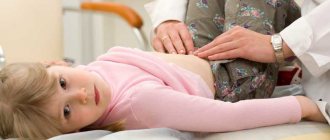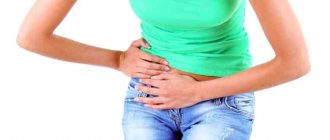Such unpleasant phenomena as rumbling, gurgling in the stomach and loose stools can disrupt all plans and cause significant discomfort. Often, unpleasant symptoms are associated with indigestion, the causes of which can be either eating low-quality or too fatty food, or the penetration of intestinal infections into the gastrointestinal tract. To eliminate the pathological process and improve well-being, you need to find out the true source of the problem and take all kinds of therapeutic measures.
Non-infectious causes
Complaints of severe rumbling in the abdomen, accompanied by repeated loose stools, may arise due to:
- Long-term antibiotic therapy leading to intestinal dysbiosis.
- Illiterate use of laxatives, which some people use to cure constipation.
- An unbalanced diet, when the menu consists of only carbohydrates or a large amount of vegetables.
- Physical inactivity. A sedentary lifestyle contributes to the development of congestion in the pelvic organs and the gastrointestinal tract.
- Irritable bowel syndrome, the causes of which are still unclear. It is believed that stress and overwork cause diarrhea and rumbling in the stomach at any time of the day, immediately after eating.
- Allergic food reactions, to which the body responds with repeated loose stools and loud rumbling.
If non-infectious diarrhea occurs and stomach churning begins, body temperature remains normal. Such individuals do not experience pain caused by sudden spasms, and there is no loss of strength or general deterioration in well-being.
Pathological causes
Signs of the pathological process: nausea, vomiting, headache, sweating, general malaise develop when seething in the stomach and frequent watery diarrhea are provoked by the penetration of dangerous intestinal infections.
In case of infectious infection:
- The person’s well-being deteriorates significantly, and the body temperature rises.
- Excruciating nausea, seething, pain and cramps appear in the abdomen.
- Due to general poisoning, the severity of pathological signs becomes vivid. The patient is noticeably weakened, he often has diarrhea with gases, and his stomach growls.
- Bloody or mucous discharge is observed in the feces. It is these symptoms that indicate damage to the body by an intestinal infection that requires medical supervision.
Infectious diarrhea and unpleasant rumbling in the stomach can be caused by pathogens such as:
- Salmonella.
- Shigella.
- Vibrio cholerae.
- Escherichia coli.
- Yersinia.
- Enteroviruses.
The transmission routes of these pathogens are associated with:
- Food products contaminated with pathogens.
- Violation of basic hygiene rules.
- Failure to comply with food preparation technology.
The pathogen Salmonella is often present on the shells of chicken/quail eggs. When ingested, it causes constant rumbling in the stomach, incessant loose stools, dehydration (dehydration), and high fever. The disease is severe and can cause serious complications.
With dysentery, the patient experiences pain in the intestines, rumbling, diarrhea, insurmountable weakness, and chills. Mucous components, blood inclusions, and sometimes pus are found in the stool.
When you need medical help
Medical supervision is not required if the abdominal pain and diarrhea do not cause other symptoms and go away within one to two days. The body itself will overcome the disease and cleanse itself of harmful substances without drugs. You will need to see a doctor when pathological signs are an undeniable symptom of the disease:
- Feces appear with a repulsive odor and a changed color (it can be black, green, white).
- Rumbling, seething in the stomach with diarrhea is accompanied by flatulence, pain and unbearable pain.
- Mucous/bloody discharge is visible in the stool, while the stomach rumbles, and putrid belching is present.
- Vomiting and nausea occur repeatedly, and the appearance of vomit does not bring lasting relief.
- Rumbling, bloating and diarrhea do not go away for several days, even with changes in diet and taking medications.
Important! If the stomach is seething, fever and diarrhea appear, and over time, the pathological signs do not subside, gradually intensifying, the patient should seek medical advice.
Additional symptoms
Initially, symptoms appear in the form of rumbling in the stomach, if no action is taken, then diarrhea begins.
In addition, other manifestations of discomfort are possible, which are expressed by the following symptoms:
- Bloating as a result of severe gas formation, the stomach growls. A similar symptom is typical for diarrhea from antibiotics.
- With frequent stress, not only diarrhea may appear, but also a constant desire to defecate, especially in tense situations.
- When the body reacts to the wrong foods or diet, a wandering rumbling appears in the stomach, severe diarrhea begins, as well as excessive accumulation of gases.
- When the intestines are infected with Salmonella, a person may additionally experience nausea, vomiting, which appears when the condition worsens, fever, and weakness in the body.
- Symptoms of dysentery include diarrhea, and the stool contains mucus, and a temperature of about 37-38.5 degrees appears.
- With botulism, a person develops acute loose stools, there is a strong rumbling in the stomach, stool may resemble water, the skin becomes paler and the temperature rises within 38-39 degrees. After a while the patient becomes lost in space.
Regardless of the cause and symptoms, it is recommended that if the illness persists for a long time, consult a doctor, especially if the diarrhea and rumbling do not stop after a couple of days and folk remedies and other remedies do not help.
Diagnosis and medical care are also necessary if abdominal pain, impurities in stool, and general deterioration of the condition occur.
Diagnostic measures
In many ways, therapeutic measures depend on the provoking factor. If the patient constantly has a seething in the stomach, and diarrhea appears against this background, the following diagnostic measures are carried out:
- General therapeutic examination.
- Laboratory testing with determination of blood, urine, feces, and vomit parameters.
- Gastroscopy.
If there is a need, the patient is referred for irrigoscopy or colonoscopy. The latter is carried out to examine the mucous membrane of the large intestine. Having received the results of the examination, the doctor can decide on further tactics for treating diarrhea, which causes rumbling and other painful symptoms.
Diagnostics
If you have abdominal problems that do not disappear within 2-3 days, you should go to a therapist who will prescribe an initial examination. Diagnostics is carried out using the following methods:
p, blockquote 28,0,0,0,0 —>
- Palpation. The doctor examines the patient, palpates his abdomen, pressing on certain points. In this way, painful areas of the digestive system are detected.
- Lab tests. This examination helps to clarify the reasons that caused diarrhea and rumbling in the stomach. For this purpose, stool, urine, and blood are collected from the patient. Tests allow you to determine the type of pathogenic microbe that has entered the body.
- Fibrogastroduodenoscopy (FGDS). The essence of the method is to use a special probe, which helps to examine the walls of the gastrointestinal tract and analyze tissue samples.
These methods together allow the doctor to determine the original source of the problem and prescribe the most effective therapy.
p, blockquote 29,0,0,0,0 —>
Therapy
The specialist will definitely tell you what to do when your stomach hurts and is seething. Often the required treatment protocol is based on the following groups of drugs:
- Adsorbents . Allows you to get rid of toxic substances: Enterosgel, Smecta, Atoxil, Polysorb.
- Carminatives. Eliminate symptoms of bloating and increased gas formation: Espumisan, Meteospasmil.
- Probiotics . Used for microflora disorders and dysbacteriosis: Acipol, Hilak, Lactobacterin, Bifiform.
- Enzymes . They allow food to be digested and absorbed faster, which will help create favorable conditions for a healthy intestinal environment.
- Immunomodulators . Increases the protective functions of the body, weakened after illness.
For diarrhea and vomiting, rumbling, abdominal pain caused by botulinum toxin or other intestinal pathogen, gastric lavage is performed in an inpatient setting as first aid. The patient is then prescribed appropriate treatment based on the severity of the disease and accompanying symptoms. These may be intravenous glucose solutions for detoxification, antibiotics (for example, nitrofuran drugs).
Diarrhea in a child
Special attention should be paid if pain, bloating, and diarrhea are observed in a child.
Sad statistics show that hundreds of thousands of children die from diarrhea every year around the world, while accessible and inexpensive rehydration solutions could save more than one small life.
Diarrhea in a child is dangerous because he becomes dehydrated faster than an adult, and for children this is life-threatening.
To prevent dehydration, intoxication and to rule out an intestinal infection, you should show your child to a doctor.
If diarrhea continues for more than a day, bowel movements are very frequent, with an admixture of mucus or pieces of undigested food, the temperature has risen, the child complains of abdominal pain, becomes apathetic, lethargic, pale, you should immediately call an ambulance.
In cases of uncomplicated, one-time diarrhea, the same treatment as for an adult is suitable for a child. It is recommended to drink enough liquid.
This can be unsweetened tea, decoctions and infusions of chamomile, St. John's wort, compote of dried apples and pears, chokeberries, blueberries, alkaline mineral water from which gas has been released.
In the case of a more serious situation, when there is a suspicion of food poisoning or an intestinal infection, before the doctor arrives, you can give the child Regidron to prevent dehydration, Smecta or Atoxil to prevent severe intoxication.
Sometimes the situation develops in such a way that the child becomes ill, treatment needs to be started urgently, but there is no pharmacy nearby. In this case, a rehydration solution can be made at home.
To do this, dissolve 1 teaspoon of salt and soda and 4 teaspoons of sugar in one liter of boiled water. Give to drink in small portions.
This article is intended for general information purposes only. In case of any reason that causes stomach rumbling, flatulence, pain and diarrhea, you should consult a doctor.
Traditional methods
If a person does not have diarrhea, but the stomach is noticeably seething, and an attack of diarrhea is about to begin, you can use folk remedies, for example:
- Pour 1 tablespoon of crushed burnet rhizome into a glass of boiling water and simmer over low heat for half an hour. Cool, filter and take a tablespoon 6 times a day. This medicine relieves inflammation and has antidiarrheal properties.
- Pour a tablespoon of dried blueberries into a glass of boiling water. Let stand for 15 minutes, strain and drink instead of tea. This infusion will prevent diarrhea.
- Pour a tablespoon of knotweed into two glasses of water, bring to a boil and cook over low heat for 10 minutes. Drink the cooled medicine half a glass three times a day until symptoms disappear. This decoction relieves inflammatory processes in the intestines.
- Leave a tablespoon of crushed lingonberry leaves in a glass of boiling water for half an hour. Strain the finished broth and drink half a glass three times a day. This medicine can combat intestinal infections that cause boiling and loose stools.
If, after eating, the boil immediately begins and an attack of diarrhea is brewing, you can swallow a few black peppercorns without chewing, or drink a decoction of bird cherry, pouring a tablespoon of the fruit with a glass of boiling water. This infusion should stand for 15-20 minutes, after which you can use it instead of tea.
Treatment of diarrhea and bloating
Treatment of diarrhea and flatulence consists in eliminating the cause that caused these symptoms and will be different in each individual case.
But everyone should know the general principles of normalizing the condition of such ailments. This is first of all a strict diet.
Fried, fatty and spicy foods, smoked foods, marinades, sauces, milk, confectionery, chocolate, and cocoa are prohibited.
The patient's menu should include:
- cereals (buckwheat, rice, oatmeal)
- potatoes (especially baked)
- lean boiled meat (chicken, rabbit, turkey, veal)
- gray stale bread, crackers
- biscuits
- baked apples
- berries (blueberries, viburnum, cranberries), preferably in the form of jelly or compote
If diarrhea is accompanied by abdominal cramps, you can relieve them with No-shpa or another antispasmodic; bloating and rumbling will be overcome by Espumisan or an infusion of dill seeds, fennel, dandelion root, mint.
Ginger has also proven itself well, but this remedy cannot be used for gallstones, ulcers, or colitis.
Diarrhea will be stopped by Imodium, Loperamide. Folk remedies will also come to the rescue:
- Rinse the chicken stomach, remove the film from it, dry it well, then make a powder out of it using a coffee grinder and take it with enough water until the diarrhea stops completely. Those who often suffer from diarrhea should always have this remedy at the ready.
- Pour dry pomegranate peels with a glass of water and boil. Take 1-2 tbsp 20 minutes before meals. spoons.
- Bird cherry berries can be consumed fresh or in the form of a decoction or infusion.
- Slimy rice water.
- Herbs or herbal mixtures: oak bark, sage, St. John's wort, white cinquefoil, chamomile.
Diet
Your doctor will tell you what you can eat if you have indigestion. The main patient menu consists of:
- Sticky porridge.
- Mashed potatoes without adding oil.
- Sukharikov.
- Boiled lean meat.
Avoiding intestinal problems will help you avoid dried fruits, legumes, milk, kefir, which often cause rumbling in the stomach. If you have an intestinal disorder, the resulting food cannot be digested if you eat large portions, especially in childhood. Therefore, you need to eat little by little, but often - 4-5 times a day.
Prevention
To prevent diarrhea and rumbling in the stomach from occurring, you should adjust your diet, excluding from the menu as much as possible such foods as:
- Fast food.
- Semi-finished products.
- Carbonated drinks.
- Alcohol.
You also need:
- Thoroughly wash foods that may contain pathogenic bacteria. For some people, eating unwashed fruit picked from a tree is considered normal, but this often leads to diarrhea, which appears accompanied by rumbling and increased gas production.
- Drink only boiled or filtered water.
- Use probiotics during antibiotic therapy.
You need to carefully monitor your health and prevent the development of chronic intestinal diseases. Since when they worsen, pain, diarrhea and rumbling in the stomach may begin.
Nutrition rules
When you suffer from diarrhea or rumbling in your stomach, you need to not only get high-quality treatment, but also monitor your diet.
If the diarrhea is acute, you will need to fast for 6 hours to stop fermentation in the intestines. Otherwise, food items will cause diarrhea to resume.
The first days of the treatment menu should not contain:
- Herring.
- Legumes.
- Dairy products.
- Dried fruits.
It is recommended to use lean types of dishes, more porridges cooked in water. All food should be kept warm so as not to irritate the intestinal mucosa and not provoke the recurrence of diarrhea.
You need to eat a fairly small portion at a time so as not to complicate the digestive process, but there can be about five meals a day.
Since people with frequent and severe diarrhea become dehydrated, they need to drink a lot of water and saline solutions. It is allowed to drink strong tea without sweets to strengthen loose stools.











